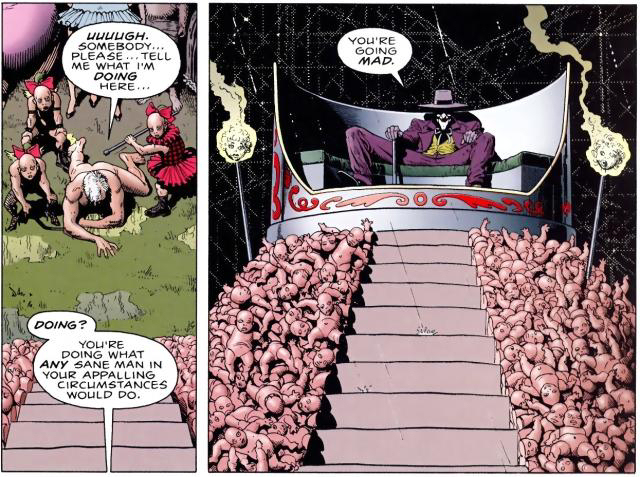The Evolving Joke

Alan Moore's work might be the most abused work in comics history. His stories are distorted into movies he hates, mainstream comics publishers mistreat him and cynically exploit his notoriety. In this age of the internet, people are getting increasingly adept at proliferating misinformation and distorting the views of prominent figures in order to buttress their own arguments, I suspect often without even realising they're making a distortion as they grab whatever they can to support their own opinions. I spotted an instance of this to-day in this article from io9 which is attempting to further the campaign against the retracted Batgirl cover by moving the argument into a larger context, a digest article of Batgirl's history. When it comes to The Killing Joke, it's too cowardly to say anything directly negative about such an esteemed book, instead it vaguely alludes to what other people have said about it;
But then, writer Alan Moore requested to use Barbara Gordon in his then-upcoming Batman graphic novel. DC agreed, and Barbara was set in place for the character's first highly controversial character beat: her paralysis at the hands of the Joker.
In the grand scheme of Alan Moore's The Killing Joke, Barbara's injury is a minor point, but for the character it came to define her for the rest of the century, and well into the 2000s. Trying to convince Batman that even the most morally just can be driven to evil, the Joker knocks on the door of the Gordon residence, and when Barbara answers the door, he shoots her through the abdomen in front of her father, Jim. Barbara isn't killed, but permanently paralyzed from the waist down, meaning that her career as Batgirl over for good. She's later captured and stripped by the Joker's goons, and it's heavily implied that she is sexually assaulted.
All these years later, The Killing Joke is still a hotly debated graphic novel. It's as beloved as a seminal Batman story as it is critiqued for its poor handling of Barbara's maiming as little more than a plot device to advance a story that was not her own. (A criticism that writer Alan Moore has since agreed with.) Feminist critics hold up the sexual overtones of the attack, as well as the depowering of an iconic female hero, as a dark moment in DC Comics history - hence the uproar when the story was used as inspiration for Rafael Albuquerque's now cancelled cover for Batgirl #41, nearly three decades later.
Unsurprisingly, the author of the article, James Whitbrook, makes no attempt to present the other side of the argument, since he knows on some level he hasn't got the chops to write a substantial essay on the topic. But the thing that stood out for me was the comment so passively inserted that it's in parentheses: "A criticism that writer Alan Moore has since agreed with." Really? Naturally, Whitbrook doesn't cite his source which to me suggests Wikipedia. In The Killing Joke's Wikipedia article there is only one direct quote from Moore on the topic, taken from an article which itself is quoting another article which no longer exists online. It's one of several interviews where Moore speaks disparagingly of The Killig Joke saying;
The Killing Joke is a story about Batman and the Joker; it isn't about anything that you're ever going to encounter in real life, because Batman and the Joker are not like any human beings that have ever lived. So there's no important human information being imparted . . . Yeah, it was something that I thought was clumsy, misjudged and had no real human importance. It was just about a couple of licensed DC characters that didn't really relate to the real world in any way.
If you want to accept Moore's criticism, you have to accept that it's impossible to tell a meaningful, human story about Batman and the Joker. Like many great authors, I think Moore sells himself and his work rather short. Anyway, the quote specifically referring to Batgirl is, "I asked DC if they had any problem with me crippling Barbara Gordon - who was Batgirl at the time - and if I remember, I spoke to Len Wein, who was our editor on the project ... [He] said, 'Yeah, okay, cripple the bitch.' It was probably one of the areas where they should've reined me in, but they didn't." The quote is taken from this badly written article which refers to an "Allan Moore". Given the numerous times men and women have been sexually assaulted or permanently injured in Moore's comics, it seems unlikely the reining in Moore's referring to is regret for ever including such a thing in a story. In fact, out of context, the comment is so vague it's hard to know what Moore really meant. He might have been referring to the fact that he made such a permanent change to a character, he may have been referring to the fact that he was writing a story that employed events more extreme than was appropriate in the DC superhero universe. He may simply have meant his motives were fundamentally contrary to Len Wein's (the most likely, in my opinion).
So my advice to you, next time you see someone quoted to support an argument, especially when quotation marks aren't used, there's no citation, and the person being quoted is reclusive and has a history of butting heads with people behind the scenes, you might want to take it mountain of salt.
Incidentally, it occurs to me all the articles that say what happens to Barbara never happens to male characters and assert that she was probably sexually assaulted never mention that her father, Commissioner Gordon, is also stripped naked by the Joker in The Killing Joke and may just as likely been sexually assaulted.
